维多利亚时代The Victorian Age
- 格式:ppt
- 大小:11.94 MB
- 文档页数:46
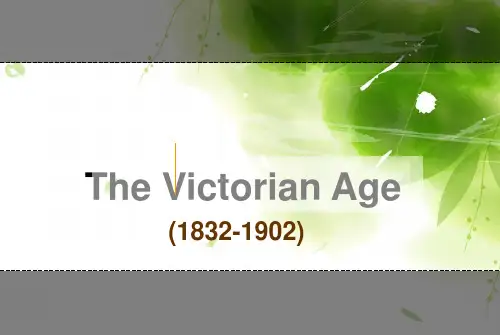
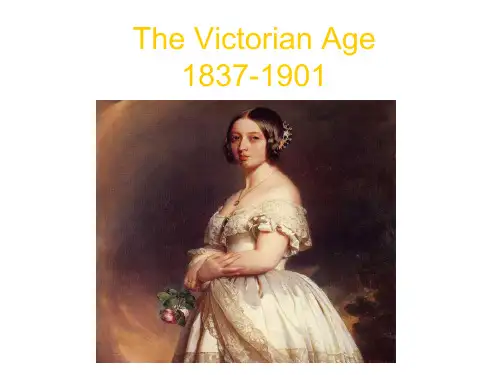
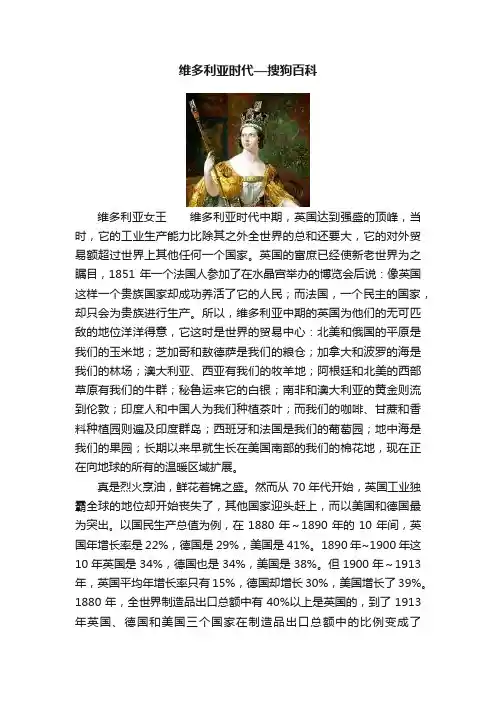
维多利亚时代—搜狗百科维多利亚女王维多利亚时代中期,英国达到强盛的顶峰,当时,它的工业生产能力比除其之外全世界的总和还要大,它的对外贸易额超过世界上其他任何一个国家。
英国的富庶已经使新老世界为之瞩目,1851年一个法国人参加了在水晶宫举办的博览会后说:像英国这样一个贵族国家却成功养活了它的人民;而法国,一个民主的国家,却只会为贵族进行生产。
所以,维多利亚中期的英国为他们的无可匹敌的地位洋洋得意,它这时是世界的贸易中心:北美和俄国的平原是我们的玉米地;芝加哥和敖德萨是我们的粮仓;加拿大和波罗的海是我们的林场;澳大利亚、西亚有我们的牧羊地;阿根廷和北美的西部草原有我们的牛群;秘鲁运来它的白银;南非和澳大利亚的黄金则流到伦敦;印度人和中国人为我们种植茶叶;而我们的咖啡、甘蔗和香料种植园则遍及印度群岛;西班牙和法国是我们的葡萄园;地中海是我们的果园;长期以来早就生长在美国南部的我们的棉花地,现在正在向地球的所有的温暖区域扩展。
真是烈火烹油,鲜花着锦之盛。
然而从70年代开始,英国工业独霸全球的地位却开始丧失了,其他国家迎头赶上,而以美国和德国最为突出。
以国民生产总值为例,在1880年~1890年的10年间,英国年增长率是22%,德国是29%,美国是41%。
1890年~1900年这10年英国是34%,德国也是34%,美国是38%。
但1900年~1913年,英国平均年增长率只有15%,德国却增长30%,美国增长了39%。
1880年,全世界制造品出口总额中有40%以上是英国的,到了1913年英国、德国和美国三个国家在制造品出口总额中的比例变成了29.9%、26.4%和12.6%,英国的下滑趋势是十分明显的。
当然这只是相对下滑,从绝对数字上看,英国仍是世界上最富有的国家,维多利亚时代最显著的特征之一就是它的富庶,直至它结束时都是这样。
然而这种富庶更像是一种罪恶,在维多利亚时代,财富的分配始终不均,贫富对比十分明显。
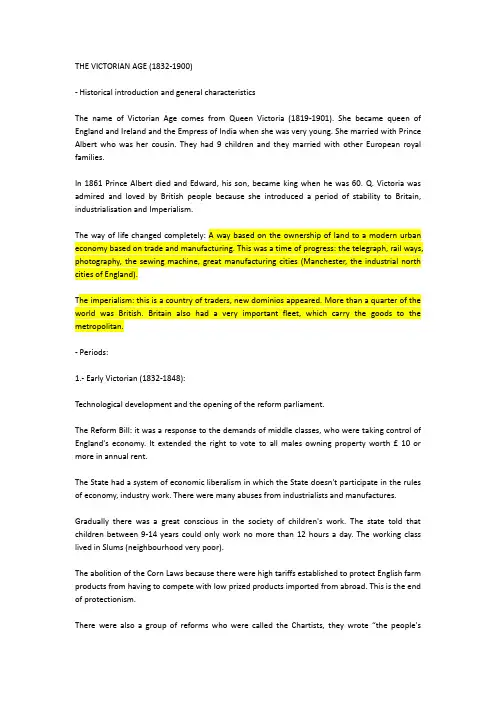
THE VICTORIAN AGE (1832-1900)- Historical introduction and general characteristicsThe name of Victorian Age comes from Queen Victoria (1819-1901). She became queen of England and Ireland and the Empress of India when she was very young. She married with Prince Albert who was her cousin. They had 9 children and they married with other European royal families.In 1861 Prince Albert died and Edward, his son, became king when he was 60. Q. Victoria was admired and loved by British people because she introduced a period of stability to Britain, industrialisation and Imperialism.The way of life changed completely: A way based on the ownership of land to a modern urban economy based on trade and manufacturing. This was a time of progress: the telegraph, rail ways, photography, the sewing machine, great manufacturing cities (Manchester, the industrial north cities of England).The imperialism: this is a country of traders, new dominios appeared. More than a quarter of the world was British. Britain also had a very important fleet, which carry the goods to the metropolitan.- Periods:1.- Early Victorian (1832-1848):Technological development and the opening of the reform parliament.The Reform Bill: it was a response to the demands of middle classes, who were taking control of England's economy. It extended the right to vote to all males owning property worth £ 10 or more in annual rent.The State had a system of economic liberalism in which the State doesn't participate in the rules of economy, industry work. There were many abuses from industrialists and manufactures.Gradually there was a great conscious in the society of children's work. The state told that children between 9-14 years could only work no more than 12 hours a day. The working class lived in Slums (neighbourhood very poor).The abolition of the Corn Laws because there were high tariffs established to protect English farm products from having to compete with low prized products imported from abroad. This is the end of protectionism.T here were also a group of reforms who were called the Chartists, they wrote “the people'scharter” (1838). It was a kind of people rights. They asked for a Universal Manhood suffrage.2.- Mid Victorian (1848-70):Because of the new inventions this is a period of prosperity (agriculture, industry...). in 1851 was “The Great Exhibition” in the Chrystal Palace, London. It shows the new inventions and congratulations of English empire.In this period there were a confrontation of ideas:Utilitarianism: it is a theory based on the idea that the rightness or wrongness of an action is determined by whether its consequences are conductive to general utility. The main thinker was Jeremy Bentham (Wrote about social happiness. He believed that individuals acted by self-interest). The utilitarians applied this idea for all the institutions, for everything.Opposed to the utilitarianism: Thomas Carlyle, he thought that intellect had limitations and couldn't explain everything and he turned to the humanism soul, a sort of religious belief was necessary to explain things.It was a group of writers who were shocked for the condition of living in some parts of England and they wrote a series of novels, “condition of England Novels” they were about living in the slums and they critiqued the oppression of working class.Elisabeth Gaskell´s “North and South” and Benjamin Disraelis “Sybil of the two nations”3.- Late Victorian: (1870-1900):The U.K. had more competitors in trade, e.g. The United States and Germany which was becoming an empire.It is a period in which workers began to join in associations, which are called trade unions. The first workers who went together were miners and textile workers. A very important association until today is called The Trade Union Congress (1868), which is the assembly of all the associations. From here we have an order of workers and a political party, Labour Party (1906)GENERAL CHARASTERISTICS OF VICTORIAN LITERATURE1. - Prose: The beginning of a new kind of prose, the lyric prose, is a prose that not only communicate ideas, it express it beautifully. In this time the readers wanted for advice from authority and some writers provided advise, people needed a guide. E.g. Thomas Carlyle, John Henry Newman, Mathew Arnold. It's full of prepositions because of this didactic style and parallelisms.2. - Poetry: It was considered superior than prose, novel theatre. They said that the writing of agenius must be poetry. There were two main romantic inheritances in poetry:1.- the use of retrospective forms: archaic language. They revived many old forms (particularly the mixture of lyric and elegy which influenced others forms like epigram).2.- experimentation with genres. Some poets continued the movement of colloquial diction into poetry (Robert Browning)3. - Novel: The main theme is man in society (family, business, friends...). they don't speak abut the past, speak about things that were happening in that time. (Dickens, Brontës).4. - Drama: Theatre had a little importance (Oscar Wilde, George Bernal Shawn)THE BRONTËS- Charlotte Brontë (1816-1855)- Emily Brontë (1818-1848)- Anne Brontë (1820-1849)Their father, Patrick Brontë was a clergyman in Yorkshire. He had six children, his mother died very soon. The four eldest were sent to a boarding school. The two eldest died of tuberculosis so the four children that remain were educated at home.He encouraged the children to learn by their own. Mr Brontë discussed poetry, history and politics with his children. The children themselves created a world of fantasy. Mr. Brontë gave his son a book of wooden soldiers, the soldiers became for them the centres of an increasingly elaborate set of manuscripts. They created new countries like Angria, Gondal. They wrote little novels of these imaginary countries.They worked as teachers and governess and they wanted to set up their own school. They wen to Brussels to study language.Branwell (the brother) was a very talented as a writer and painter, he took drugs and alcohol and died in 1848. In the funeral Emily caught a cold and it developed into tuberculosis and died in December, a year late Anne also died.- Charlotte Brontë: “Jane Eyre”, the novel examines many sides of the circumstances of women show a new move towards freedom ad equality.- Emily Brontë: “Wuthering Heights”, it is a novel of passion, an early psychological novel.- Anne Brontë: “The Tenant of Wildfell Hall” With an unusual central female character andinvolving complex relationships and problems.CHARLES DICKENSHe was born in the south of England, his father was a clerk, he went to prison and Dickens had to work in a factory (blacking workhouse) when he was 12 years old. He lived in different parts of London and knew poverty and London slums. He used this material in his novels.He became a reporter, he worked in many magazines and published in one of these magazines several sketches of the life and manners of the time these were together in one volume “Sketches by Boz”.He was asked to write “The Pickwick Papers” in 20 monthly numbers. He published his novels by instalments, he had to maintain the interest of the readers in order they want to read the following chapters. While he was writing the novel knew how was the reaction of the people, what people preferred and he could change the direction of the novel. Many critics think that the novels published in this way have a loose structure.He got married Catherine Hogarth, they had ten children, the couple separated because he had an affair with an actress. He went to America twice making them read his novels. He left his last novel unfinished.Sentimental work:- “Oliver Twist” (1837-38): it shows a great concern about social problems. He had very strong opinions against the factories in which children worked. It is a story of a poor boy that worked in a factory and describes his situation. He went away and discovered a band of thieves who taught him to be a thief. The novel is a mixture of melodrama and realism.- “The curiosity shop” (1840-41):This is the story of little Nell, a girl who lives with her grandfather. Her grandparent borrows money to a miser who takes the shop because he can't pay. They have to go away because the miser persecuted them.- “A Christmas Carol”: Scrooge a very bad miser received the visit of 3 ghosts which show past, present and the following Christmas and showed how bad he is.- “David Copperfield” (1949-50): The hero David, becomes the kind of success which Victorians admired, he is rich, he marries, and a general sense of happy ending is given. This novel was based in part of Dickens's own childhood and his success.Works after 1850:- “Bleak house”: it is a satire of the delays of law. It's a process which never ends.- “Hard Times”: it is an attack on capitalism, society and industrial life.- “A Tale of cities”: historical novel on the French revolution.- “ Great expectations”: it is about an orphan who has a secret benefactor. He help a prisoner to escape, the convict later helps him.General characteristics:He saw the world as a fresh experience. He had an extraordinary range of language, he could use colloquial and formal language. Great characters and intense emotionalism.THOMAS HARDY: “Far for the Madding Crowd”The tittle comes from the poem “Elegy written in a country churchyard”. It was published in 1874 in a magazine in serial form. He had to write in the way the readers wanted to know what was going to happen in the next chapter. It had a great success. When it was published he was 33 years old and it was his 4th novel.All Hardy's novels are settled in Wessex (the south west of England where there are a lot of counties, it is an imaginary noun).Hardy was very pessimistic and the main theme of his novels is the struggle of man against the indifferent forces that rule the world, his novels are tragic.In the first chapter, there is an introduction of the two main characters: Gabriel Oak and Bathseba; it is located in the countryside, rural setting.The narrator is omniscient, he controls everything. They are confident, they are sure of them. He goes through the novel controlling the novel, he could also change the point of view.Man in society is the main characteristic of Victorian novels. Gabriel is seen from the point of view of others.The basic idea is that he was just an ordinary man: Hardy conveys these ideas offering images of behaviour.GEORGE ELIOT (1819-1880)Her name was Mary Ann Evans, she used a pseudonym for his publications. She was born in the Church of England. At the school she converted into Methodism, which is very strict in words. She was a very cultivate woman, she was agnostic because of her intellectual formation. She translated religious texts and the critic about it. She was strongly influenced by religious concepts of love, morals, duty and behaviour.She became the assistant editor of a magazine, “The Westmister Review”. She felt strongly in love with the editor but this love was not reciprocated. Later she felt in love with Herbert Spencer but again this relation didn't go well. She met another writer G.H. Lewis, they felt in love and they went to live together until Lewis' death(1878). When he died she married her financial adviser (two years later) and seventeenth months later she died.Works:She translated many religious books. She knew Italian, German... she translated Feverbach's “Essence of Christianity”. It is important because she agreed with Feverbach view that religious beliefs are an imaginative necessity of man and a projection of his interest.Her novels were published by instalments. She has been considered the first modern English novelist.In the first generation the writers considered themselves as providers of advise and public entertainers. They wrote books to enjoy and offer them some advice. The new writers of the second generation took their job very seriously, they considered themselves as novelists, professional writers.Eliot takes her works seriously as novelists, the structure has to be perfect. She was a moral writer in the sense that she believed that the responsibility for a man's life and fate lay firmly on the individual and his moral choices. The individual has to decide in every situation and has the responsibility of his life. But the individual decisions are not external.She wrote: “Adam Bede”, “The Mill on the floss”, “Silas Marner”, “Romola, “Felix Holt”, “Middlemarch”, “Daniel Deronda”.We can represent her novels in two circles:“Middlemarch”: It was published in a serialised for. It is considered a masterpiece. The tittle is the changed name of a city where the action happens, Middlemarch is the provincial of Coventry. This novel is set during the years of the 1st reform bill. It has a multiple plot, with many arguments, several interlocking sets of characters, so she created a network that enclosed the whole life of this city.One of the stories is the story of Dorothea Brooke and Mr. Casaubon. She is an intelligent idealistic young woman and married Mr. Casaubon (a pedant). She wants to share her husband's world. When she married she realized that her husband has plans but didn't worked at them, she loses the respect of him. She begins to fell in love with Ladislaw.Another history is Dr. Lydgate, a young and very ambitious man who had plans, he wants to stablish professionally. A very beautiful woman plans to marry him, her name was Rosamand.They married but it didn't go well because she is materialist and selfish. He gets involved in some problems. In a determined point, Dorothe sees Rosemand and Ladislaw together and she decides not to love him.All the characters Know each other, at the end all the plots have relation between them, it makes a perfect portrait.THOMAS HARDY (1840-1928)He was born in Dorchester. His father was a stonemason and he worked as an apprentice to several architects, learning the profession. He began to write poetry and in the period of 1870-3 he published his first three novels, his great success came with his fourth novel, “Far from the Madding Crowd” (1874). Then he left architecture for novel writer. The most important novels that he published are “The return of the native” (1878), “The major of Casterbridge”(1886), “Tess of the D'urbervilless” (1891), and “Jude de Obscure” (1896).He became a very well known figure in London. His works were very tragic. The critics criticised his two last novels, they said that they were very immoral and pessimistic and because of this he abandoned the fiction novels and wro te only poetry, such as “Wessex Poems” (1898). He called himself “meliorist” and said that the world could be better by human effort. He received a honorary degree from Cambridge University.Work:The main theme is the struggle of man against the indifferent forces that rule the world: how people suffer because of fate who are more powerful than him. The disparity between the things that people wanted to be and the things that actually they are, between human ambition and fate. The fate is completely eternal and is important, also the social conditions.The characters are not the masters of their own fate but they can achieve dignity by endurance. He offers some sense of human in the description of rural characters.“Wesssex” is the name he gave to the south west of England. He changed the names of the places, the villages are real but the name is invented.“Tess of the D'urbervilless” : Tess is a country girl who is seduced by Alec, a rich young man, she gets pregnant and Alec leaves her. The child dies so she is very miserable, she has to work as a maid. She meets another man, angel, who is the son of a priest and they married. In the wedding night, Tess told about Alec and Angel abandoned her.Tess has to accept to become the mistress of Alec because of her bad situation. Angel returns to look for his wife, but Tess and Alec are living together. Tess gets mad and kills Alec. She is hung because of this.OSCAR WILDE (1854-1900)He was born in Dublin. His father was a very famous surgeon and his mother was a very well known poetess in Dublin. She was very controversial, provocative, excentric and Oscar had her influence. He was very estrange physically: tall, fattish, big dreamy eyes, too fleshy, big mouth, at the same time he was beautiful and awful. He dressed extravagantly because he didn't feel ashamed of his appearance.He learnt from his mother how to be funny courageous and he was a transgressor (to break the rules of society). He went to Oxford and he was a very good student. He caught syphilis from a prostitute. At the age of 29 he married Constance Lloyd. They had 2 children but soon Constance was a very sexual object for him. He convinced his wife to stop having sexual relationships, but they continued living together.By this time he wrote books of poems, tales, fairy stories. He was an excellent conversationalist, he speaks beautifully, funny, witty. Some writers said he looked like disgusted at first impression. Under this image, superficial, trivial, he was transcendent, he belonged to a poetical movement called Aestheticism whose motto is art for art sake.In 1891 Oscar met Lord Alfred Douglas (Basic) who was 21 years and Oscar 37. Basic was a young rich selfish, conceited, frivolous, cruel man. Oscar felt in love desperately in love with basic, who introduced him to the world of underground and make Oscar's life very awful. Oscar tried to leave him but he couldn't because he loved him and Bosie threatened Oscar to suicide if Oscar left him. Bosie's father was the marquis of Queensberry, he knew the relation between them and they became enemies.Meanwhile Oscar published his only novel “The portrait of Dorian Gray”, is a sort of gothic novel. Dorian wanted to be young forever. He wanted to try forbidden things.The real success came with his plays: “Lady Wardermere's fan” (1892); “A woman of no importance (1893); “An ideal husband” (1895); “The importance of being Earnest” (1895). ð Witty, funny, word plays, paradoxes.15 days after the streno of the last play Bosies's father left a note in Oscar's club accusing him of being sodomite. Oscar didn't want to answer. Bosie told Oscar to take his father to court because of difamation. The case was a hopeless case, because during the trial all the things they had done appeared and Oscar was arrested and taken to a jury. During this second case all the people he had met in the underground come to the court and told all the things they had done.He was sent to prison. Two years of force labour and his name was a matter of shame. His novels were retired of libraries; his novels never were represented again. His wife changed her surname and her child's. After 2 years he was a broken man and his friends took him to France. Oscar accepted to see Bosie again, who left him when discovered that Oscar didn't write and had lost his glamour.“The Ballad of Reading Gaol” (1898) about his prison experience.The last work published after his death “De Profundis” (1905) is a letter to reproche to Bosie, a confession.ALFRED, LORD TENNYSONHe is the Victorian poet, he wrote the model of Victorian poetry. Queen Victoria was an admirer. She was a widow for 40 years and found consolation in Tennynson's poetry. He is the poet of love and loss.His father was a priest, he was the fourth of twelve children. Their father taught them privately: classical language, philosophy, reading. He went to Cambridge and became friend of a group of artists and writers. One of them was Arthur Hallan, who was his confident, adviser, closest friend. He became engaged Arthur's sister, but died at the age of 22 and this provoqued a great depression in Tennynson, it was the origin of the poem “In Memorian” (1850)Before 1850 he had written many books of poems although they didn't became famous. He became Poet Laureate; before this publication he had the recognition of his works and it gave him a lot of money.Works:“Poems, chiefly lyrical” (1830); “in Memorian” (1850);“The charge of the light Brigade”(1854): it is inspirited on a piece of news on the newspaper about the soldiers who died in the Crimean War.“Maud” (1855): It is a monologue and best seller“Idylls of King” (1859): It is about King Arthur.General characteristics of his literature:Great virtuosity of technique. He studied the poetry of his predecessors and achieved a great technique.He had a great capacity to link scenarios to states of mind. His vision of nature is not idealistic as romantics. He prefers rural things rather than urban.Preoccupation with the problems of his days: about technological changes, he thought that it was positive but he was very worried because of horrors of industrialism (slums, working conditions, working of the children).He was an admirer of Yeats.“In Memorian”He started it in 1833. It is a series of poems put together around the same theme: the death of his friend. More than an elegy is a group of poems about anxieties and doubts about the meaning of life, what a rule of a man was in the world and doubts because of the death of his friend. It is a poet diary upon his reflections on this matter.ROBERT BROWNING (1812-1889)/ ELISABETH BROWNING (1806-1861)Robert is admired for two things:moral toneinnovations in poetry- Robert browning was born in London, he was the son of a banker, and educated basically at home because his father had a great library and he read a lot.At the beginning he wrote personal poems. Some critics attacked his poems and he was embarrassed because of this, so he changed his way of writing( very personal), which became more obscure.After 1936 and during ten years, he wrote plays but without success, but it was a good practice for a new model of poetry which he developed; dramatic monologue. It was his best known kind of poetry because he could write in a personal way under a character.“Dramatics Lyrics” (1842) it was the first collection of this kind of poetry.After 15 years in Italy, he and his son came back to England. He wrote “Dramatis Personae” (1864) which was a monologue; “The Ring and the Book”.- Elizabeth was a very well known poet who was semi-invalid, under the control of her father. She was kept at home, she had a tyrannical father, she was very well educated.She published “Poems” (1844) and Robert read it and enjoyed it very much and they stablished a correspondence. After a time they became engaged secretly. In 1846 they got married secretly and eloped to Italy and stayed there for 15 years. There she discovered that she wasn't invalid and they were very happy. The product of their love is “ Sonnets from the Portuguese” (1850): a sequence of forty four sonnets in which she recorded the stages of her love for Robert Browning, a sequence she presented under the guise of a translation from the Portuguese language.“Aurora Leigh”(1857)Differences between Browning and TennysonTennyson was the Victorian poet who was worried with the topics of the age. But he explored the topics of the day in a different way: faith/doubt, Good/evil.The main difference is the style. Tennyson belonged to the lyrical tradition. Browning had a more colloquial, prosaic tone, his poems are like prose.The social world within which this dilema has to be resolvedThe centre of her novelsA small group of individuals involved in a normal dilema。
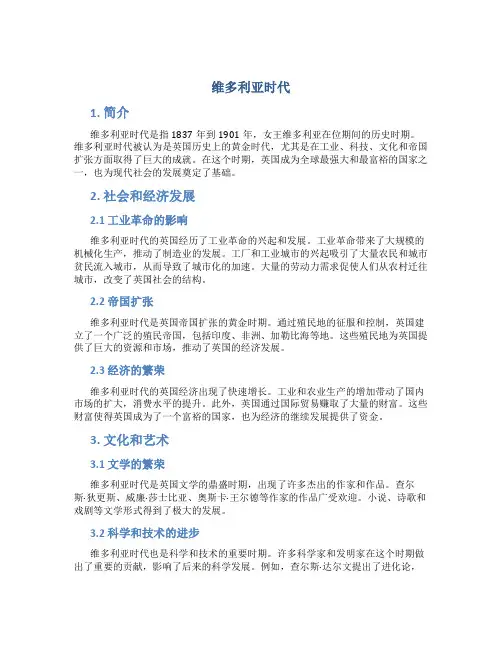
维多利亚时代1. 简介维多利亚时代是指1837年到1901年,女王维多利亚在位期间的历史时期。
维多利亚时代被认为是英国历史上的黄金时代,尤其是在工业、科技、文化和帝国扩张方面取得了巨大的成就。
在这个时期,英国成为全球最强大和最富裕的国家之一,也为现代社会的发展奠定了基础。
2. 社会和经济发展2.1 工业革命的影响维多利亚时代的英国经历了工业革命的兴起和发展。
工业革命带来了大规模的机械化生产,推动了制造业的发展。
工厂和工业城市的兴起吸引了大量农民和城市贫民流入城市,从而导致了城市化的加速。
大量的劳动力需求促使人们从农村迁往城市,改变了英国社会的结构。
2.2 帝国扩张维多利亚时代是英国帝国扩张的黄金时期。
通过殖民地的征服和控制,英国建立了一个广泛的殖民帝国,包括印度、非洲、加勒比海等地。
这些殖民地为英国提供了巨大的资源和市场,推动了英国的经济发展。
2.3 经济的繁荣维多利亚时代的英国经济出现了快速增长。
工业和农业生产的增加带动了国内市场的扩大,消费水平的提升。
此外,英国通过国际贸易赚取了大量的财富。
这些财富使得英国成为了一个富裕的国家,也为经济的继续发展提供了资金。
3. 文化和艺术3.1 文学的繁荣维多利亚时代是英国文学的鼎盛时期,出现了许多杰出的作家和作品。
查尔斯·狄更斯、威廉·莎士比亚、奥斯卡·王尔德等作家的作品广受欢迎。
小说、诗歌和戏剧等文学形式得到了极大的发展。
3.2 科学和技术的进步维多利亚时代也是科学和技术的重要时期。
许多科学家和发明家在这个时期做出了重要的贡献,影响了后来的科学发展。
例如,查尔斯·达尔文提出了进化论,詹姆斯·瓦特发明了蒸汽机,这些发明和理论对工业生产和交通运输都起到了重要的推动作用。
3.3 艺术和建筑维多利亚时代的艺术和建筑也达到了巅峰。
维多利亚女王的统治促进了建筑、雕塑、绘画等艺术形式的发展。
许多城市的建筑风格也受到维多利亚女王的喜好影响,出现了许多以维多利亚时代风格为主题的建筑。
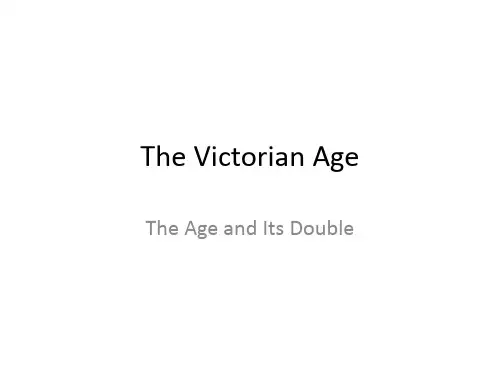
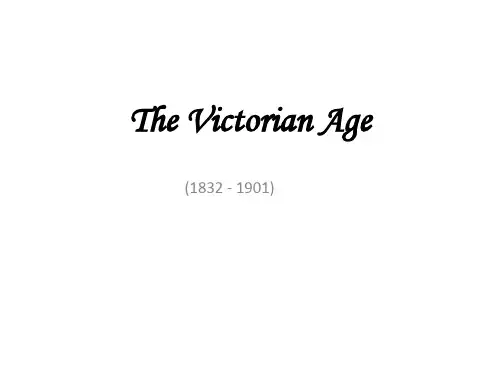
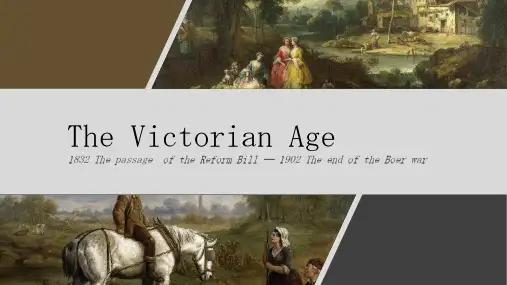
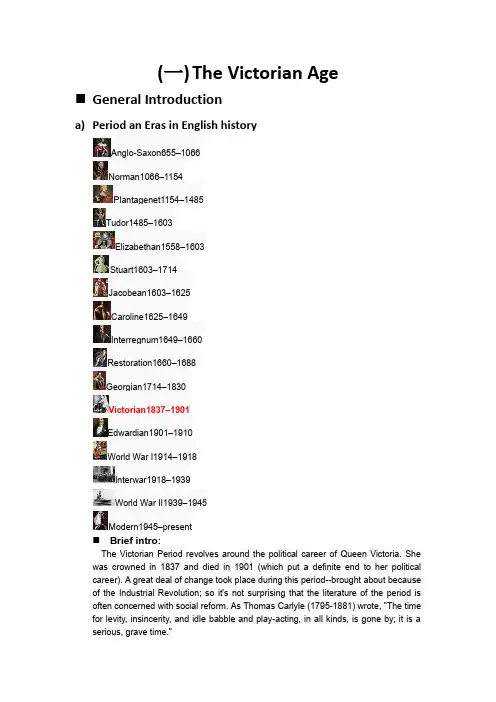
(一)The Victorian Age⏹General Introductiona)Period an Eras in English historyAnglo-Saxon655–1066Norman1066–1154Plantagenet1154–1485Tudor1485–1603Elizabethan1558–1603Stuart1603–1714Jacobean1603–1625Caroline1625–1649Interregnum1649–1660Restoration1660–1688Georgian1714–1830Victorian1837–1901Edwardian1901–1910World War I1914–1918Interwar1918–1939World War II1939–1945Modern1945–present⏹Brief intro:The Victorian Period revolves around the political career of Queen Victoria. She was crowned in 1837 and died in 1901 (which put a definite end to her political career). A great deal of change took place during this period--brought about because of the Industrial Revolution; so it's not surprising that the literature of the period is often concerned with social reform. As Thomas Carlyle (1795-1881) wrote, "The time for levity, insincerity, and idle babble and play-acting, in all kinds, is gone by; it is a serious, grave time."b)Victoria Period1)Time Span⏹The Victorian Period revolves around the political career of Queen Victoria.⏹ A new era really began with the passage of Reform Bill 1832 and closed at the end ofBoer War in 1902.2)Three phases⏹The early Victorian period (1830~48): 多事之秋(A Time of Troubles)It saw the opening of Britain’s first railway and its first Reform Parliament, but it wasalso a time of economic distress.⏹The mid-Victorian period (1848~70): 经济繁荣和宗教分歧的时期(EconomicProsperity and Religious Controversy)It was not free of harassing problems, it was a time of prosperity, optimism, andstability.⏹The later period (1870~1901) : 由盛到衰过程的时期(Decay of Victorian Values)The costs of Empire became increasingly apparent, and England was confronted withgrowing threats to its military and economic preeminence.c)Queen Victoria and Victorian Temper⏹Victoria was born in 1819.She came to the throne in 1837(aged 18), after the death ofher uncle William IV, crowned in 1838 and died in 1901.⏹She reigned for exactly 63 years, 7 months, 2 days (June 20, 1837 - January 22, 1901),longer than any other British monarch.⏹Her 9 children and 42 grandchildren tying them together and earning her the nickname"the grandmother of Europe".⏹Exemplifies Victorian qualities: earnestness, moral responsibility, domestic propriety⏹The Victorian Period was an age of transition⏹An age characterized by energy and high moral purpose1819年生于伦敦,1837年继位成为英国女王。
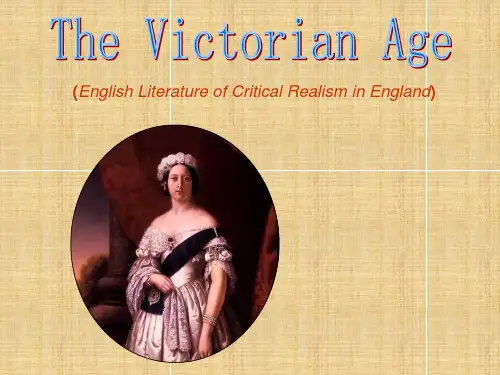
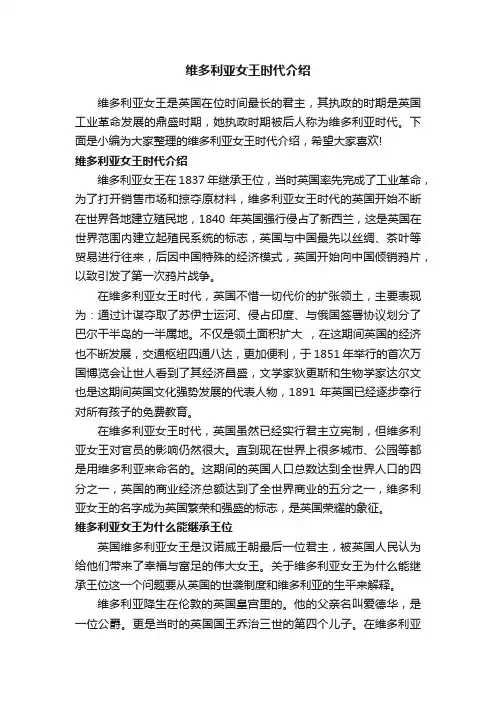
维多利亚女王时代介绍维多利亚女王是英国在位时间最长的君主,其执政的时期是英国工业革命发展的鼎盛时期,她执政时期被后人称为维多利亚时代。
下面是小编为大家整理的维多利亚女王时代介绍,希望大家喜欢!维多利亚女王时代介绍维多利亚女王在1837年继承王位,当时英国率先完成了工业革命,为了打开销售市场和掠夺原材料,维多利亚女王时代的英国开始不断在世界各地建立殖民地,1840年英国强行侵占了新西兰,这是英国在世界范围内建立起殖民系统的标志,英国与中国最先以丝绸、茶叶等贸易进行往来,后因中国特殊的经济模式,英国开始向中国倾销鸦片,以致引发了第一次鸦片战争。
在维多利亚女王时代,英国不惜一切代价的扩张领土,主要表现为:通过计谋夺取了苏伊士运河、侵占印度、与俄国签署协议划分了巴尔干半岛的一半属地。
不仅是领土面积扩大,在这期间英国的经济也不断发展,交通枢纽四通八达,更加便利,于1851年举行的首次万国博览会让世人看到了其经济昌盛,文学家狄更斯和生物学家达尔文也是这期间英国文化强势发展的代表人物,1891年英国已经逐步奉行对所有孩子的免费教育。
在维多利亚女王时代,英国虽然已经实行君主立宪制,但维多利亚女王对官员的影响仍然很大。
直到现在世界上很多城市、公园等都是用维多利亚来命名的。
这期间的英国人口总数达到全世界人口的四分之一,英国的商业经济总额达到了全世界商业的五分之一,维多利亚女王的名字成为英国繁荣和强盛的标志,是英国荣耀的象征。
维多利亚女王为什么能继承王位英国维多利亚女王是汉诺威王朝最后一位君主,被英国人民认为给他们带来了幸福与富足的伟大女王。
关于维多利亚女王为什么能继承王位这一个问题要从英国的世袭制度和维多利亚的生平来解释。
维多利亚降生在伦敦的英国皇宫里的。
他的父亲名叫爱德华,是一位公爵。
更是当时的英国国王乔治三世的第四个儿子。
在维多利亚的童年时光中,生活并不是那么简单的。
在她年仅8个月大的时候,身体一直非常健康的父亲在一次打猎的时候感染上了风寒,从此一病不起,不久便去世了,还使这个不幸的家庭背上了沉重的债务。
英国维多利亚时代的历史维多利亚时代是英国历史上一个重要的时期,从1837年至1901年,由维多利亚女王在位期间所主导。
这段时期经历了工业革命的巨大影响,对英国社会、经济和文化产生了深远的影响。
本文将介绍维多利亚时代的历史背景、社会变革、经济发展以及文化传统。
一、历史背景维多利亚时代是以维多利亚女王的名字命名的,她于1837年继承王位,直至1901年去世。
这段时期是英国历史上最长的一个君主统治时期。
维多利亚女王在位期间,英国经历了许多重大的历史事件,如克里米亚战争、殖民扩张和印度起义等。
二、社会变革维多利亚时代是英国社会变革的时期。
随着工业革命的兴起,城市化和工业化的进程加速,城市间的社会差距进一步拉大。
工人阶级在这个时期迅速增长,他们面临着恶劣的工作条件、长时间劳动以及低工资。
一些知识分子开始关注社会不公平问题,催生了社会改革的运动。
三、经济发展维多利亚时代是英国经济发展的黄金时期。
工业革命的推动促进了工业生产的发展,英国成为世界上最大的工业制造国。
铁路和蒸汽机的广泛应用改变了人们的生活方式,商品交流和市场扩大到全国乃至全球。
此时期的英国逐渐成为一个富裕的国家,国内生活水平和生产力大幅提升。
四、文化传统维多利亚时代也是英国文化传统的重要时期。
维多利亚女王对于道德和家庭价值观的强调影响了整个社会。
文学是这个时期最重要的艺术形式之一,查尔斯·狄更斯、简·奥斯汀等作家的作品成为经典,描绘了社会各个层面的生活。
同时,维多利亚时代也见证了女性权益的崛起,女性开始争取教育机会和参与社会活动的权利。
综上所述,维多利亚时代在英国历史上扮演了重要的角色。
这段时期的社会变革、经济发展和文化传统都对英国乃至全球的发展产生了深远的影响。
维多利亚时代的历史值得我们深入研究和探索,它不仅仅是英国历史上的一个时期,更是人类社会发展进程中的一个重要里程碑。
English Literature of the Victorian Age1. The Victorian Period:Chronologically the Victorian period roughly coincides withthe reign of Queen Victoria who ruled over England from1836to 1901. The period has been generally regarded as one of the most glorious in the English history. II. Historical Background1. economy: Industrial Revolution (1760 – 1840)2. politics: Chartist movement (1838 – 1848) 宪章运动3. science: Darwin’s theory of evolution(1859)4. society: the women question Queen Victoria ( 1837 – 1901)The early years of the Victorian England was a time of rapid economic development as well as serious social problems.III. Critical Realism1. definition----English critical realism of the 19th century flourished in the 40s and in the early 50s. It found its expression in the form of novel. The critical realists, most of whom were novelists, described with much vividness and artistic skill the chief traits of the English society and criticized the capitalist system from a democratic viewpoint.2. Features:Victorian literature, as a product of its age, naturally took on its quality of magnitude & diversity. It was many-sided & complex, & reflected both romantically & realistically the great changes that were going on in people’s life & thought. Great writers & great works abounded.a. introduction of characters from the working classb. strong hatred for vices in the societyc. an illusion of bringing about social justice and harmony by reformsd. an interest in woman emancipation (Charlotte Bronte)3. Representatives:Charles Dickens; William Thackeray etc.4. Features of Victorian novelsIn this period,the novel became the most widely read & the most vital & challenging expression of progressive thought. While sticking to the principle of faithful representation of the 18th-century realist novel, novelists in this period carried their duty forward to the criticism of the society & the defense of the mass. Although writing from different points of view & with different techniques, they shared one thing in common, that is, they were all concerned about the fate of the common people. They were angry at the inhuman social institutions, the decaying social morality as represented by the money-worship & Utilitarianism & the widespread misery, poverty & injustice. Their truthful depiction of people’s life & bitter & strong criticism of the society had done much in awakening the public consciousness to the social problems & in the actual improvement of the society.Victorian literature, in general, truthfully represents the reality & spirit of the age. The high-spirited vitality, the down-to-earth earnestness, the good-natured humor & unbounded imagination are all unprecedented. In almost every genre it paved the way for the coming century, where its spirits, values & experiments are to witness their bumper harvest.The Chartist Movement (1836-1848)The English workers got themselves organized in big cities & brought forth the People’s charter, in which they demanded basic rights & better living & working conditions. They, for three times, made appeals to the government, with hundreds of thousands of people’s signatures. The movement swept over most of the cities in the country. Although the movement declined to an end in 1848, it did bring some improvement to the welfare of the working class. This was the first mass movement of the English working class & the early sign of the awakening of the poor, oppressed people.UtilitarianismAlmost everything was put to the test by the criterion of utility, that is, the extent to which it could promote the material happiness. This theory held a special appeal to the middle-class industrialists, whose greed drove them to exploiting workers to the utmost & brought greater suffering & poverty to the working mass.Critical RealismThe Victorian Age is an age of realism rather than of romanticism-a realism which strives to tell the whole truth showing moral & physical diseases as they are. To be true to life becomes the first requirement for literary writing. As the mirror of truth, literature has come very close to daily life, reflecting its practical problems & interests & is used as a powerful instrument of human progress.Dramatic MonologueBy dramatic monologue, it is meant that a poet chooses a dramatic moment or a crisis, in which his characters are made to talk about their lives, & about their minds & hearts. In “listening” to those one-sided talks, readers can form their own opinions & judgments about the speaker’s personality & about what has really happened. Robert Browning brought this poetic form to its maturity & perfection & his “My Last Duchess” is one of the best-known dramatic monologues.Further Reading:After the Reform Bill of 1832 passed the political powerfrom the decaying aristocrats into the hands of the middle-class industrial capitalists, the Industrial Revolution soongeared up. Towards the mid-century, England had reachedits highest point of development as a world power. Andyet beneath the great prosperity & richness, there existedwidespread poverty & wretchedness among the workingclass. The worsening living & working conditions, themass unemployment & the new Poor Law of 1834 with itsworkhouse system finally gave rise to the Chartist Movement (1836-1848).During the next twenty years, England settled down to a time of prosperity & relative stability. The middle-class life of the time was characterized by prosperity, respectability & material progress.But the last three decades of the century witnessed the decline of the British Empire & the decay of the Victorian values.Ideologically, the Victorians experienced fundamental changes. The rapid development of science & technology, new inventions & discoveries in geology, astronomy, biology & anthropology drastically shook people’s religious convictions. Darwin’s The Origin of Species (1859) & The Descent of Man (1871) shook the theoretical basis of the traditional faith. On the other hand, Utilitarianism was widely accepted & practiced. Almost everything was put to the test by the criterion of utility, that is, the extent to which it could promote the material happiness.Charles Dickens (1812-1870)I. Life:1. a middle class family2. once was a child labor in a shoe-blacking factory3. a clerk, a reporter, a writer4. the poets’ cornerII. Major Works1. Oliver Twist;雾都孤儿2. David Copperfield;大卫·科波菲尔(autobiographical)3. Hard Times; 艰难时世4. A Tale of Two Cities双城记III. three periodsa. optimismb. frustrationc. pessimism1. Period of youthful optimistSketches by Boz 《博兹札记》(1836); The Posthumous Papers of the Pickwick Club 《匹克威克外传》(1836-1837); Oliver Twist 《雾都孤儿》or 《苦海孤雏》(1837-1838); Nicholas Nickleby《尼古拉斯·尼克贝》(1838-1839); The Old Curiosity Shop《老古玩店》( 1840-1841); Barnaby Rudge《巴纳比·拉奇》(1841)2. Period of excitement & irritationAmerican Notes 《美国纪行》(1842); Martin Chuzzlewit 《马丁·翟述伟》(1843-1845);A Christmas Carol 《圣诞颂歌》(1843); Dombey & Son 《董贝父子》(1846-1848); David Copperfield 《大卫·科波菲尔》(1849-1850)3. Period of steadily intensifying pessimismBleak House 《荒凉山庄》( 1852-1853); Hard Times 《艰难时世》(1854); Little Dorrit 《小杜丽》(1855-1857); A Tale of Two Cities 《双城记》(1859); Great Expectations 《远大前程》or 《孤星血泪》(1860-1861); Our Mutual Friend 《我们共同的朋友》(1864-1865); Edwin Drood 《艾德温·德鲁德之谜》(unfinished) (1870)Distinct Features of His Novels1. Character Sketches & ExaggerationIn his novels are found about 19 hundred figures, some of whom are really such “typical characters under typical circumstances”, that they b ecome proverbial or representative of a whole group of similar persons.As a master of characterization, Dickens was skillful in drawing vivid caricatural sketches by exaggerating some peculiarities, & in giving them exactly the actions & words that fit them: that is, right words & right actions for the right person.2. Broad Humor & Penetrating SatireDickens is well known as a humorist as well as a satirist. He sometimes employs humor to enliven a scene or lighten a character by making it (him or her) eccentric, whimsical, or laughable. Sometimes he uses satire to ridicule human follies or vices, with the purpose of laughing them out of existence or bring about reform.3. Complicated & Fascinating PlotDickens seems to love complicated novel constructions with minor plots beside the major one,or two parallel major plots within one novel. He is also skillful at creating suspense & mystery to make the story fascinating.4. The Power of ExposureAs the greatest representative of English critical realism, Dickens made his novel the instrument of morality & justice. Each of his novels reveals a specific social problem.5.unnatural happy endingHis Literary Creation & Literary AchievementsCharles Dickens is one of the greatest critical realistic writers of the Victorian Age. It is his serious intention to expose & criticize in his works all the poverty, injustice, hypocrisy & corruptness he saw all around him. In his works, Dickens sets a full map & a large-scale criticism of the 19th-century England, particularly London. A combination of optimism about people & realism about society is obvious in these works. His representative works in the early period include Oliver Twist, David Copperfield & so on.His later works show a highly conscious modern artist. The settings are more complicated; the stories are better structured. Most novels of this period present a sharper criticism of social evils & morals of the Victorian England, for example, Bleak House, Hard Times, Great Expectations & so on. The early optimism could no more be found.Charles Dickens is a master story-teller. His language could, in a way, be compared with Shakespeare’s. His humor & wit seem inexhaustible. Character-portrayal is the most outstanding feature of his works. His characterizations of child (Oliver Twist, etc.), some grotesque people (Fagin, etc.) & some comical people (Mr. Micawber, etc.) are superb. Dickens also employsexaggeration in his works. Dickens’ works are also characterized by a mixture of humor & pathos. William Makepeace ThackerayI. Lifea. born in India;b. studied in Cambridge;c. gambling and bad investmentsd. has to make a living by writing articles for newspapers and magazines.II. featuresa. Just like Dickens, Thackeray is one of the greatest critical realists of the 19th century Europe. He paints life as he has seen it. With his precise and thorough observation, rich knowledge of social life and of the human heart, the pictures in his novels are accurate and true to life.b. Thackeray is a satirist. His satire is caustic and his humour subtle.c. Besides being a realist and satirist, Thackeray is a moralist. His aim is to produce a moral impression in all his novelsIII. Vanity Fair ----masterpiece1. title: from John Bunyan’s The Pilgrim’s Progress.2. Subtitle: “A novel without a hero”the bourgeois and aristocratic society as a wholeno positive characters (c) female3. plot( p193 -196)Read the story from P137 to P138 by yourself. Make clear about the development of the plot and relations between main characters. (Rebecca Sharp, Amelia Sedley, Joseph Sedley, Sir Pitt Crawley, Rawdon Crawley, Lord Steyne, George Osborne, William Dobbin)Amelia: good-natured, sentimental, and simple-mindedGeorge Osborne: snobbish, caustic, selfish and simple-mindedJoseph Sedley: vain, selfish, effeminateWilliam Dobbin: good-natured, honestIII. Comparison between Thackeray and Dickenssimilarities:① both representatives of critical realism;② both novelists, humorists;③ both criticized the Victorian society satirically.2. differences:① D described the common people, T mainly described the lives of aristocrats and rich people.②D was a sentimentalist. T was a cynic who doubted the goodness of human nature as a spectator.③ D advocated social reforms, T was not a crusader for good causes.④ D was a romanticist, T was against all romantic conventions.George eliotI. life1. George Eliot (1819-1880), pseudonym of Mary Ann Evans, was born on Nov. 22, 1819 into anestate agent’s family in Warwickshire, England.2. Though brought up under strict religious influences, she early abandoned religious beliefs, adopted agnostic opinions about Christian doctrine, & showed a great interest in social & philosophical problems.3. At the age of 39, she started he literary career. Being a woman of intelligence & versatility, she quickly found herself ranking high among the great writers.4. In 1857, she wrote her first three stories which were later published in book form under the title of Scenes of Clerical Life.II. Literary Career1. her three most popular novels came successively, Adam Bede (1859), The Mill on the Floss (1860) & Silas Marner (1861), all drawn from her lifelong knowledge of English country life & notable for their realistic details, pungent characterization & high moral tone.2. 1863, Romola, a full elaborately documented story of Florence in the time of Savornarola.3. Felix Holt, the Radical, her only novel on English politics.4. 1872, Middlemarch, a panoramic book, George Eliot’s greatest achievement5. 1876, last novel, Daniel Deronda.These novels, together with a number of poems & a collection of satirical essays, The Impressions of Theophrastus Such, constitute a formidable body of work from a woman frail in health & working constantly under the apprehension of failure or worthlessness.III. Achievements1. Writing at the latter half of the 19th century & closely following the critical realist writers, George Eliot was working at something new.2. By joining the worlds of inward propensity & outward circumstances & showing them in the lives of her characters, she starts a new type of realism & sets into motion a variety of developments, leading in the direction of both the naturalistic & psychological novel.3. In her works, she seeks to present the inner struggle of a person & to reveal the motives, impulses & hereditary influences which govern human action.4. She is interested in the development of a soul, the slow growth or decline of moral power of the character.5. Eliot holds the belief that a certain act in daily life will produce a definite moral effect on the individual.6. Most of her novels are characterized by two features: moral teaching & psychological realism. IV.The theme of her worksAs a woman of exceptional intelligence & life experience, George Eliot shows a particular concern for the destiny of women, especially those with great intelligence, potential & social aspirations. In her mind, the pathetic tragedy of women lies in their very birth. Their inferior education & limited social life determine that they must depend on men for sustenance & realization of their goals, & they have only to fulfill the domestic duties expected of them by the society. Their opportunities of success are not even increased by wealth.Charlotte Bronte & Emily BronteI. Life of the Bronte sistersCharlotte(39), Emily(30) ,Anne(29)1. born in Yorkshire moors, daughters of a poor country clergyman.2. 2 elder daughters died in the charity school3. Charlotte and Emily once worked as governessesII. Jane Eyre 简·爱III. Wuthering Heights 呼啸山庄1. Plot (P264-268)a story about two families and an intruding stranger2. Point of view: first person point of view;3. narration: two dramatic narrators (Mr. Lockwood, and Nelly Dean)IV. detail-reading (268-278)1. content: Final meeting of Heathcliff and Catherine before Catherine’s death2. narrator: Nelly Dean3. their love: passion, love, agony, horror4. Catherine:a common girl who met an uncommon love. In her heart, the struggle between true love and tradition never ceased, and finally caused her early death.5. theme :a. criticism upon the materialism and social discrimination.b. hatred and revenge are meaningless; only love lasts forever.6. features: Romantic color (private passion and personal emotions; description of nature; Gothic elements)Gothic NovelThe word “Gothic”originally implied medieval, but in the later 18th century, when the Gothic novel became influential, the word added the implication of mystery, horror and supernatural. Gothic novel is a type of prose fiction which flourished in 1790s and early years in the 19th century. It once refers to the novel which produces stories set in lonely frightening Gothic places. It is now generally applied to literature dealing with the strange, mysterious and supernatural designed to invoke suspense and terror in the readers.On Gothic NovelThere is a strong Gothic strain in many mainstream 19th century works, including the works of the Brontes, Dickens, Edgar Allan Poe, and Hawthorne.In the 20th century, the genre flourished notably in popular horror fiction and films.Jane eyreSignificance:1. one of the most popular & important novels of the Victorian age.2. its introduction to the English novel the first governess heroine.II. Point of viewfirst person point of viewIII. Character (Jane Eyre)1. a naïve, kind-hearted, noble-minded woman who pursues a genuine kind of love.2. a middle-class workingwomen (governesses) struggling for recognition of her rights & equality as a human being.3. possessed of strong feelings, fiery passions & extraordinary personalities.IV. Themethe struggle of an individual towards self-realization.V. Style1. realism (criticism of the existing society) combined with romanticism (horror, mystery & prophesy)2. intensity of vision and passion3. The vividness of her subjective narration, the intensely achieved characterization4. vivid description of her intense feelingsVI. Detail-reading (Chapter XXIII)Jane finds herself hopelessly in love with Mr. Rochester but she is aware that her love is out of the question. So, when forced to confront Mr. Rochester, she desperately & openly declared her equality with him & her love for him. The passion described here is intense & genuine.Alfred Tennyson (1809-1892)I. life1809: Born at Somersby rectory, 4th son of the rector.1827: Poems by Two Brothers. Enters Trinity College, Cambridge.1829: Friendship with Arthur Hallam. love with Emily Tennyson.1831: Father dies.1832: brother Edward goes insane.1833: Hallam dies.1834: love with Rosa Baring1838: Engaged to Emily Sellwood.1840: Engagement broken off.1844: Has an emotional breakdown.1850: In Memoriam published anonymously. Marries Emily Sellwood. Appointed Poet Laureate. 1852: Son Hallam born.1862: Has first audience with Queen Victoria.II. Works:1. Poems by Two Brothers2. Poems, Chiefly Lyrical3. Poems (two volumes)4. The Princess5. Maud6. The Idylls of the King7. In MemoriamIII. Break, break, break(p294)IV. Features:1. T’s thoughts on the problems of life, death and immortality2. the conflict between the spirit and the flesh3. classical materialsRobert Browning & Elizabeth BarrettI. LifeLegendary love, happy marriageII. E’s WorksFrom Sonnets from the Portuguese(p305)III. Features:1. theme: love2. Feature: reason & emotion3. significance: set up new belief for Victorians who were thrown into a crisis in faithRobert BrowningRobert Browning (1812-1889) was born in a well-off family & received his education mainly from his private tutor, & from his father, who gave him the freedom to follow his own interest. In 1833, he published his first poetic work Pauline, which brought great embarrassment upon him. But in his second attempt Sordello (1840), he went too far in self-correction that the poem became so obscure as to be hardly readable. He even tried play writing but failed. All these frustrating experiences forced the poet to develop a literary form that suited him best & actually give full swing to this genius, i.e. the dramatic monologue.In 1846, Browning married Elizabeth Barrett, a famous poetess whose famous book of love poetry was Sonnets from the Portuguese. In 1869 Browing’s masterpiece, The Ring & the Book, came out. In 1889, Browning died & was buried in the Poet’s Corner, Westminster Abbey, beside Tennyson.My Last Duchess"My Last Duchess" is Browning’s best-known dramatic monologue. The poem takes its sources from the life of Alfonso II, duke of Ferrara of the 16th-century Italy, whose young wife died suspiciously after three years of marriage. Not long after her death, the duke managed to arrange a marriage with the niece of another noble man. This dramatic monologue is the duke’s speech addressed to the agent who comes to negotiate the marriage. In his talk about his "last duchess," the duke reveals himself as a self-conceited, cruel & tyrannical man. The poem is written in heroic couplets, but with no regular metrical system. In reading, it sounds like blank verse.V. the Dramatic Monologue戏剧独白The dramatic monologue is a soliloquy in drama in which the voice speaking is not the poet himself, but a character invented by the poet, so that it reflects life objectively.Thomas Hardy(1840-1928)I. Life (novelist and poet)a. Born in Dorchester —“Wessex”b. close to peasantryc. belief in evolutionII. Works:1. Tess of the D’Urbervilles《德伯家的苔丝》2. Jude the Obscure《无名的裘德》3. The Return of the Native《还乡》4. Far from the Madding Crowd《远离尘嚣》5. The Mayor of Casterbridge《卡斯特桥市长》III. Tess of the D’Urbervilles1. subtitle “a pure woman”2. Plot (p315-319)3. Pessimistic philosophy; critical realism; symbolism; naturalism;IV. H’s Ideas of FateMost of Hardy’s novels are tragic. The cause is not man’s own behavior or his own fault but the supernatural forces that rule his fate. According to Hardy, man is not the master of his destiny; he is at the mercy of indifferent forces which manipulate his behavior and his relations with others.John Galsworthy(1867-1933)I. lifeBorn in a rich bourgeois familyA representative of bourgeois realism in English novel of 20th centuryII. work1. The Island Pharisees岛国的法利赛人2. The Man of Property有产业的人3. Forsyte Saga福尔赛世家4. The End of the Chapter尾声III. Forsyte Saga(p352-356)1. powerful sweep2. brilliant illustrations3. deep psychological analysis4. satire & criticismIV. point of viewG’s works give a complete picture of English bourgeois society. Yet his criticism was limited to the spheres of ethics and aesthetics. Facing the crisis of British imperialism and the growing forces of socialism, Galsworthy began to idealize the decadent bourgeoisie.1. Modernism in English Literature prevailed during the 20s and 30s of the 20th century2. OriginThe concept of modernism emerged in the eighteenth century when the classicists mocked those who opposed them and called them modernists. Now it is a comprehensive term applied to international tendencies and movements in all creative arts in the 20th century. In a broad sense, it is applied to writing marked by a strong and conscious break with traditional forms and techniques of expression.3. Major philosophical Influences on modernism1) Darwinism 2) Marxism 3) Freudianism4. Major ideas of modernism1) It employs a distinctive kind of imagination. Thus it practicessolipsism( 唯我论). It believes that we create the world in the act of perceiving it.2) It implies a historical discontinuity, a sense of alienation, loss and despair. It rejects traditional values and assumptions. And it looks forfresh ways of looking at man’s position and function in the universe.Many modernists are philosophical existentialists.3) It elevates the individual and his inner being over social man andprefers the unconscious to the self-conscious. It celebrates passion andwill over reason and systematic morality.4) It rejects the traditional rhetoric by which tradition values and assumptions were communicated. It is bent on stylistic innovations and experiments with language, form, symbol and myth.4. Modernist movements1)Symbolism 2)imagism 3)aestheticism 4)expressionism5) the stream of consciousness 6)surrealism 7) existentialism8) theatre of the absurdLawranceI. TitleThe representative of psychological fiction.II. Life(p415-417)III. works(1) Sons and Lovers儿子与情人(2) The Rainbow虹(3) Women in Love恋爱中的女人(4) Lady Chatterlay’s Lover 查泰莱夫人的情人IV. Sons and Lovers1. autobiographical2. the Oedipus complex3. themea) the damage caused in family relationship by industrial forceb) the split of human beingsc) natural love as the only cureWoolfI. title:The representative of “stream of consciousness”school of novelII. LifeA novelist, critic and feminist; nervous breakdown since childhood; self-suicide III. Works1. Mrs. Dalloway达洛维夫人2. To the Lighthouse到灯塔去3. The Waves海浪4. A Room of One’s Own一间自己的房间5. Modern Fiction现代小说IV. Mrs. Dalloway (p441-445)V. point of view1. She challenged the traditional way of writing.2. She thought the depiction of details darkened the characters.3. She called the writers for writing about events of daily life that gave one deep impression.V. Influence(1) The stream of consciousness presented by Joyce and Woolf marks a total break from the tradition of fiction and has promoted the development of modernism.(2) However, because of the newness in form but hard to understand, this kind of fiction cannot attract readers.(3) The writers showed interest in the psychological depiction of the bourgeoisie but neglected the conflict that most people cared about at that time.James joyceI. Title: the representative of the “stream of consciousness”school of novelII. “stream of consciousness”1. definition:a psychological term indicating “the flux of conscious and subconscious thoughts and impressions moving in the mind at any given time independently of the person’s will”2. time: in the 20th century3. foundations:a. the literary device of “interior monologue”内心独白b. Freud’s theory of psychological analysisIII. J’s worksa. A Portrait of the Artist as a Young Man青年艺术家的画像b. Dubliners都柏林人c. Ulysses尤利西斯d. Finnegans Wake芬尼根觉醒IV. significance of his worksa. He changed the old style of fictions and created a strange mode of art to show the chaos and crisis of consciousness of that period.b. From him, stream of consciousness came to the highest point as a genre of modern literature.c. In Finnegans Wake, this pursue of newness overrode the normalness and showed atendency of vanity.William Butler Yeats(1865-1939)I. title“the greatest poet of our age –certainly the greatest in this (English) language”-----T. S. Eliot II. LifePoet and dramatistIrishLifelong love for Maud GonneIII. Works1. The Responsibilities责任2. The Land of Heart’s Desire理想的国土3. When You Are Old4. The Winding Stair盘旋的楼梯5. The Hour Glass时漏6. The Tower塔IV. FeatureHe is a celebrated and accomplished symbolist poet, using an elaborate system of symbols in his poems. But read as a whole, his poetry is elucidated by itself and gives the reader many memorable stanzas and lines of great poetry. (moon, water, rose)V. Themes1. Patriotism;2. love;3. civilization;4. age;5. the relation between imagination, history and the occultVI. When you are oldWhen you are old and gray and full of sleep,And nodding by the fire, take down this book,And slowly read , and dream of the soft lookYour eyes had once, and of their shadows deep;How many loved your moments of glad grace,And loved your beauty with love false or true,But one man love d the pilgrim soul in you,And loved the sorrows of your changing face;And bending down beside the glowing bars,Murmur, a little sadly, how love fledAnd paced upon the mountains overheadAnd hid his face amid a crowd of stars.George Bernard Shaw(1856-1950)I. TitleA representative of critical realism in modern English literatureII. lifeIreland;socialist Movement;criticize the evil of capitalism;support the forces of revolution and democracyIII. works (plays unpleasant)Widower’s Houses 鳏夫的房产Major Barbara巴巴拉少校Heartbreak House伤心之家Mrs. Warren’s Profession华伦夫人的职业The Apple Cart苹果车。
英国维多利亚时代到底是一个怎样的时代?2015-10-12姚之彼方(芈笑摘藏)昨天一位朋友问我电影《灰姑娘》是不是维多利亚时代的故事?▼尤其是其中的服饰和各种装饰非常华丽▼其实,灰姑娘的故事并不是发生在维多利亚时代为达到炫目的视觉效果那些繁复精致的服饰只是《灰姑娘》中运用的维多利亚时代的元素比如这辆金灿灿的马车和当时维多利亚女王的马车非常相似▼马车的细节是这样的▼那今天就来说一下维多利亚时代维多利亚时代(Victorian era)通常被认为是1837年~1901年,即维多利亚女王(Alexandrina Victoria)的统治时期。
当时大英帝国领土达到了3600万平方公里。
整个帝国(主要是殖民地)共有22个时区,还差2个时区就要一统全球了。
这时是英国最强盛的所谓“日不落帝国”时期。
据电影记载女王登基的时候是这样的▼那时的经济占全球经济总量的70%贸易出口更是比全世界其他国家的总和还多上几倍富裕了的人们打扮也就比较讲究当时的妹子应该是这样的▼人们追求艺术文化的内涵醉心于精致生活品味所以那时贵族的生活是这样的▼而且文化艺术蓬勃发展当时的文艺运动流派包括古典主义新古典主义浪漫主义印象派艺术以及后印象派等艺术界呈现出群星夺目的盛景▼古典主义艺术家Alma-Tadema维多利亚时代还涌现出了许多伟大的作家、诗人以及他们的传世之作如女作家夏洛蒂·勃朗特《简·爱》现实主义小说家查尔斯·狄更斯《雾都孤儿》▼《简爱》电影剧照当时还发明了一种生活方式影响至今那就是“下午茶”▼英国贝德芙公爵夫人安娜女士,每到下午时刻就意兴阑珊、百无无聊,心想此时距离穿著正式、礼节繁复的晚餐Party还有段时间,又感觉肚子有点饿了,就请女仆准备几片烤面包、奶油以及茶。
后来安娜女士邀请几位知心好友一起共度下午茶时光。
然后大家发现,这真的是一个朋友聚会,彰显名流身份的好方法。
于是在贵族社交圈内风行起来。
当时候油画这样描绘▼除了喝茶吃点心以外在这个下午茶时间一般大家只做三件事情1.享受氛围在英国的维多利亚式下午茶传统里要在家中最好的房间用最好的瓷器接待来宾悠扬的古典音乐来陪衬而上等的茶品与精致的点心是最重要▼2.谈恋爱这种交际场合最适合为恋人们制造浪漫气氛如此精致优雅的调调初次见面的年轻人非常容易一见钟情觉得不谈个恋爱都可惜了而且后来下午茶又衍生出了茶话舞会淑女名媛们可以在那里与男友会面▼3.搭配花草茶由于当时国力强盛世界各地的香料和茶叶都大批运到英国其实下午茶的茶不单单是常见的红茶还有很多花茶搭配下午茶时主人不免要聊到这些茶的来源以及这些花草茶的药用价值▼而维多利亚女王本人倾心花草茶她的花草茶配方据说来自中国清朝宫廷由6种花草按比例搭配制成女王驻颜有术她的画像是这样的▼对于这种新鲜的玩法以及名媛们对美丽的追求使得“下午茶”活动一直风靡即使60年后维多利亚时代结束了这种生活方式仍然保留下来影响至今▼下午茶是一门综合的艺术华丽却不庸俗随着时代的进步及茶类的种类繁多不但下午茶的花样多选择也多▼如果利用一个午后和亲密的朋友来段午后之约何尝不是件赏心悦目的事即使独自一人这个秋天也有花草茶香为伴。
victorian period名词解释
维多利亚时期(Victorian period)指的是1837年至1901年之间,维多利亚女王统治英国的时期。
这是英国工业革命的巅峰时期,也是英国经济、文化和科学发展的黄金时代。
维多利亚女王在位期间,英国从一个农业为主的国家转变为一个工业和商业强国,成为了全球最大的经济体。
同时,维多利亚时期也是英国文学、艺术和建筑的重要时期,许多经典作品和建筑在这一时期诞生。
此外,维多利亚女王本人也成为了一个文化象征,她的形象和价值观影响了整个欧洲和北美。
英国历史中的维多利亚时代维多利亚时代是英国历史上一个重要且独特的时期,它从1837年至1901年期间,以女王维多利亚的统治命名。
这个时代是英国工业革命的巅峰时期,也是英国帝国最辉煌的时期之一。
维多利亚时代的英国面貌深深影响并塑造了现代英国的社会、政治和文化方面。
本文将深入探讨维多利亚时代的历史背景、社会发展、艺术文化以及对现代英国的影响。
一、维多利亚时代的历史背景自1688年的格洛里亚革命以来,英国逐渐实行了君主立宪制度。
1837年,维多利亚登基为女王,拉开了维多利亚时代的帷幕。
在这一时期,英国成为世界第一强国,拥有全球属地和殖民地。
同时,英国工业革命持续推进,铁路、制造业、煤矿等产业蓬勃发展,经济迅速崛起。
二、维多利亚时代的社会发展在维多利亚时代,英国社会经历了巨大变革。
工业化的快速发展带来了城市化的进程,大量人口从农村迁徙至城市。
贫困与社会问题日益严重,工人阶级的生活条件恶劣,但劳工运动的兴起逐渐改善了工人的待遇。
教育改革也成为维多利亚时代的重要议题,普及教育的推行改变了社会的阶级结构。
三、维多利亚时代的艺术文化在维多利亚时代,英国艺术和文化达到了巅峰状态。
文学方面,查尔斯·狄更斯、夏洛蒂·勃朗特、丹尼尔·笛福等作家的作品广受欢迎;奥斯卡·王尔德、罗伯特·路易斯·史蒂文森等文学巨匠也在这个时期崭露头角。
建筑方面,哥特式风格的建筑在维多利亚时代得到广泛应用,伦敦的大本钟和伦敦塔桥即为代表。
此外,维多利亚时代的绘画、音乐、戏剧等艺术形式也取得了巨大成就。
四、维多利亚时代对现代英国的影响维多利亚时代是现代英国的基石,对现代英国产生了深远影响。
首先,维多利亚时代标志着英国工业革命的巅峰,奠定了英国作为工业强国的地位。
其次,维多利亚时代的社会变革和教育改革为现代英国的社会制度和教育体系打下了基础。
此外,维多利亚时代产生的文化和艺术成就,成为英国文化的重要组成部分,对英国文化的传承与发展具有重要意义。